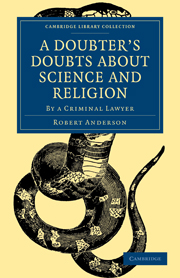Summary
“It's lovely to live on a raft. We had the sky up there all speckled with stars, and we used to lay on our backs and look up at them and discuss about whether they were made, or only just happened. Jim he allowed they was made, but I allowed they happened; I judged it would have took too long to make so many. Jim said the moon could 'a laid them; well, that looked kind of reasonable, so I didn't say nothing against it, because I've seen a frog lay most as many, so of course it could be done. We used to watch the stars that fell, too, and see them struck down. Jim allowed they'd got spoiled and was hove out of the nest.”
In this charming piece of fooling, Mark Twain states the problem admirably. The question is whether things were made, or “only just happened.” But Jim, being a philosopher, suggested evolution as a compromise, and Huck Finn's deism was not intelligent enough or vigorous enough to resist it.
“Only just happened”—that supreme folly of nineteenth-century philosophy, is as really a positive creed as the Mosaic cosmogony. And surely a venerable faith of any sort is preferable to a new-fangled superstition which has no rational sanction and is devoid even of that kind of respectability which antiquity can sometimes impart.
In our search after the origin of life, reason guides us in a path which leads direct to God.
- Type
- Chapter
- Information
- A Doubter's Doubts about Science and ReligionBy a Criminal Lawyer, pp. 20 - 37Publisher: Cambridge University PressPrint publication year: 2009First published in: 1889

